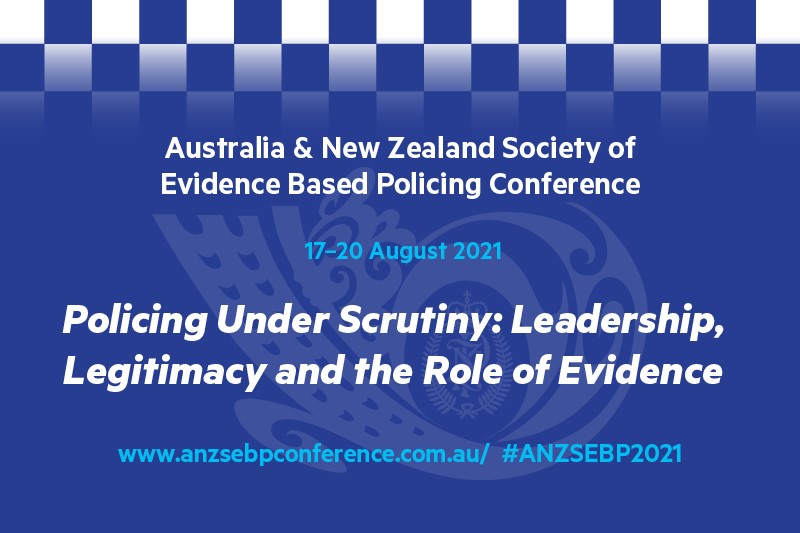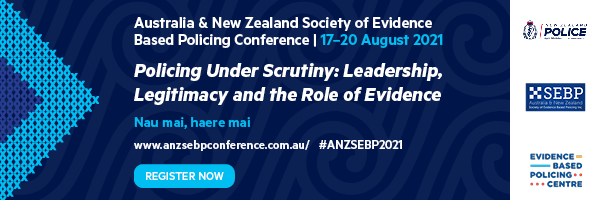Evidence-Based Policing (EBP) ensures that policing strategy, operations, and tactics are based on what works, according to evidence and research. Rather than being guided by assumptions, tradition, convention, or subjective impressions, EBP combines the existing skills, knowledge and experience of police with research, crime science, problem-solving and testing.
We have a number of world-leading criminologists, academic thinkers and police professionals engaged in a dialogue that will have particular resonance for policing audiences around the world.
The conference this year will look at the role that evidence, its legitimacy, and our policing leadership have in everyday policing. We have a number of world-leading criminologists, academic thinkers and police professionals engaged in a dialogue that will have particular resonance for policing audiences around the world.
The leadership panel will provide insights into the importance of using evidence to drive and enable decision-making. Drawing particularly on examples from Australasia – where the ANZSEBP has made significant strides in recent years, and now includes working-level representatives from every Australian state policing agency and New Zealand Police – this session will be of particular interest to all police leaders, and to those that aspire to future leadership roles.
More than ever, the role and ‘voice of community’ is important, with particular attention on policing with indigenous communities. This is one of the challenging subjects we will cover in a panel session. We have brought together experts from around the world to discuss this in one of our Q&A sessions: Dreaming our future: is an authentic indigenous/government research relationship achievable?
The conference has an indigenous policing kaupapa throughout the programme, and solutions to challenges raised will be considered across the week of the conference.
The conference will be held online this year, with participants joining from New Zealand, Australia, Spain, United Kingdom, Canada, India and the United States of America.
Presentations and conversations will span a range of subjects including family harm, child/adult sexual abuse, police legitimacy, youth, leadership, prevention opportunities, high risk offenders/groups, and property crime. We have leading criminologists and academics presenting on these subjects.
Keynote speakers include Law Professor Tom Tyler from Yale University on authority dynamics, Dr Jarrod Gilbert –renowned for his gang work in New Zealand, and Dr Cynthia Lum – Director of George Mason University’s Evidence-Based Crime Policy.
Outside of the keynote speakers, panels, and presentations, there will be 50 “short shot sessions” over the three days. In these sessions, experts share their thoughts on a specific subject for 10 minutes, followed by 5 minutes for questions and answers. This includes topics such as: the changing culture of Australian outlaw motorcycle gangs, how an online subculture has led to violence against women, and modelling the behavioural patterns of family violence aggressors.
There will be a leadership short shots stream which will cover a range of subjects including return to work challenges after critical incidents, crewing size and the productivity of policing, and managing serious misconduct.
The conference is open to employees of all global policing agencies (sworn and unsworn), researchers, students, and representatives from all agencies working in partnership with police to reduce crime and improve safety for communities. It is a fantastic opportunity for people to connect and share problems and ideas, and to gain global insights into evidence based policing projects that have shown results.
For more information on the conference and speakers, and to register, visit: https://www.anzsebpconference.com.au/
 R. Mark Evans OBE
R. Mark Evans OBE
Deputy Chief Executive: Insights and Deployment, New Zealand Police
Visiting Professor University College London
Vice President ANZSEBP
Mark is Deputy Chief Executive: Insights and Deployment at New Zealand Police. Prior to commencing this role, Mark was Deputy Chief Executive: Service Delivery. He has been a member of the police executive since 2011.
Deputy Chief Executive: Insights and Deployment is a new executive portfolio introduced on 1st October 2020 and is responsible for several key areas including:
- Policy and Partnerships
- Ministerial Services
- Intelligence
- Evidence Based Policing
- Critical Command Information/Deployment
- Road Policing
Mark is also the executive lead for a number of portfolio responsibilities including the New Zealand Police response to the Royal Commission of Enquiry into the 15th March terrorist attacks in Christchurch, Police use and deployment of Emergent Technologies and the Understanding Policing Delivery research work programme.
Additionally, the post includes executive leadership of a number of functions focused on lifting performance including Tasking and Co-ordination and problem solving.
Mark is Vice President of Australia and New Zealand Society of Evidence Based Policing (ANZSEBP), a member of the Global Advisory Board for Policing Insight, a member of the World Class Policing Awards Judging Panel and a fellow of the Institute of Strategic Risk Management.
Mark came to New Zealand in 2007, having previously been the Director of Analytical Services for the Police Service of Northern Ireland. Mark has an MBA from Manchester Business School and in the New Year’s Honours 2006 was awarded an OBE for services to policing. He is a frequent contributor to international intelligence teaching and training, and is a Visiting Professor at University College London where he teaches on their MSc in countering organised crime and terrorism, and their MSc in Police Leadership.




